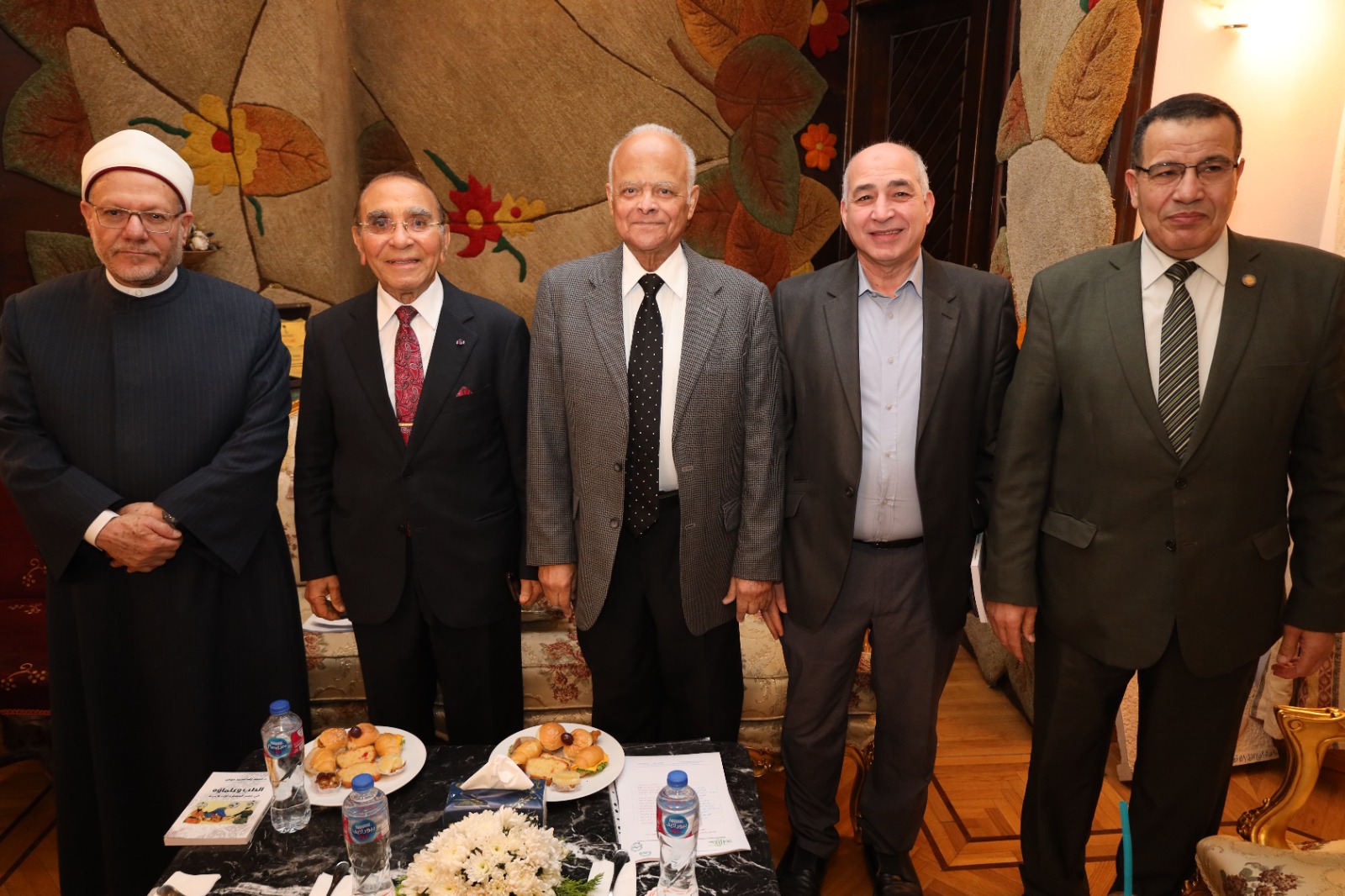In a springtime atmosphere infused with a passion for knowledge and appreciation for scholars, Misr University for Science and Technology (MUST) celebrated Arab Manuscript Day 2025 with a symposium titled “Medical Heritage between Arab-Islamic Civilization and Ancient Egyptian Civilization.” The event took place on Saturday, April 19, in the university’s main conference hall, under the patronage of Mr. Khaled El-Toukhy, Chairman of the Board of Trustees, and Professor Dr. Nehad El-Mahboob, President of the University, and was organized under the supervision of Professor Dr. Anas Atiya Al-Faqi, Director of the Arab Heritage Center.
The symposium successfully attracted a senior group of scholars in the medical sciences from within and beyond the university. The guest of honor was His Eminence Dr. Shawki Ibrahim Allam, former Grand Mufti of Egypt, who given a lecture on Islamic medical jurisprudence. The event also featured a special tribute to the deceased Professor Dr. Mohamed Fawzy Gaballah, which deeply resonated with the audience as a gesture of loyalty and recognition, coinciding with the university’s commitment to reviving medical heritage.
Dr. Gaballah had devoted his final years to the study of Arab medical heritage and completed, before his passing on February 13, 2022, the manuscript of “تبسيط المفاهيم الطبية في القانون لابن سينا” which was later edited and published earlier this year by Professor Dr. Mohamed Fathy Farag through the Arab Heritage Center.
Through its widespread work in the publication and revival of Arab medical texts, MUST has established itself as a pioneering institution not only among Egyptian universities but also across the Arab world in this specialized field.
It is also noteworthy that the symposium’s theme directly aligns with the academic specialization of the university president and many of the event’s speakers.
In his observations, Professor Dr. Anas Atiya Al-Faqi noted that the rare medical lexicon الشذور الذهبية في الألفاظ الطبية by Ibn Omar Al-Tunisi had nearly fallen into oblivion, had it not been for the efforts of the university in reviving this monumental work. Dr. Mahmoud Mahdy Badawi undertook its critical edition and indexing, eventually publishing it in five volumes.
Dr. Al-Faqi highlighted that “الشذور الذهبية في الألفاظ الطبية” , received the 2023 “Book of the Year in Heritage” Award, noting that it was originally written in Arabic during the reign of Mohamed Ali Pasha, a period marked by Egypt’s engagement with modern science. In collaboration with France, Mohamed Ali invited Clot Bey to help establish Egypt’s medical school in Abu Zaabal. The lexicon documented medical terms in Arabic and was reviewed by Al-Azhar scholars to ensure terminological accuracy and precision.
His Eminence Dr. Shawki Allam discussed juristic efforts related to medical issues preserved in the archive of Dar al-Ifta al-Misriyyah, including topics such as autopsy, medication, cosmetic surgery, fertility, paternity, in vitro fertilization, and physician liability. These fatwas reflect both an awareness of modern realities and a forward-looking vision.
Professor Dr. Mohamed Fathy Farag, Head of Basic Sciences at the Faculty of Dentistry, spoke about the Arab Heritage Center’s efforts in abridging القانون في الطب لابن سينا into a contemporary and accessible form. He also described the contributions of the late Dr. Gaballah in simplifying the Canon, noting that due to its vastness, Dr. Gaballah had proposed an abridgment of the text to roughly one-tenth of the original size, making it more approachable for a broader audience. This version also facilitates potential translation, thanks to his inclusion of modern medical terminology in English.
Dr. Gaballah’s dedication to this endeavor was driven by his admiration for the genius of classical Arab physicians, particularly Ibn Sina. Despite his senior age, he undertook the task with youthful enthusiasm and rare scholarly breadth, bridging disciplines at a time when academic specialization often discourages interdisciplinary work.
As a tribute to his memory, University President Dr. Nehad El-Mahboob presented the university’s shield to Dr. Gaballah’s daughters, Dr. Enas Mohamed Fawzy Gaballah and Dr. Iman Mohamed Fawzy Gaballah. The president also honored Dr. Shawki Allam with the university’s shield in recognition of his efforts in documenting and archiving medical fatwas at Dar al-Ifta.
Professor Dr. Mohamed Reda Awad, President of the Egyptian and Arab Society for Back Pain, spoke on the contributions of Islamic civilization to medicine between the 8th and 15th centuries CE, including clinical diagnostics, specialized hospitals, and research in internal medicine, surgery, pharmacology, and preventive care. He cited major Arabic medical encyclopedias such as The Canon by Ibn Sina, Al-Tasrif by Al-Zahrawi, Al-Hawi by Al-Razi, Al-Mujaz by Ibn Al-Nafis, and Kitab al-Adwiya by Ibn Al-Bitar.
He also referred to early works on medical ethics like Adab al-Tabib by Ibn Al-Ruhawi, who described doctors as “guardians of souls and bodies,” and to the prolific Egyptian physician Ali Ibn Ridwan, who wrote nearly 100 works in medicine and philosophy, many of which were translated into Latin.
In his contribution, Professor Dr. Samir Adeeb, an expert in ancient Egyptian civilization at the Faculty of Archaeology and Tourist Guidance, emphasized that ancient Egyptian medical papyri reveal advanced knowledge in anatomy, physiology, and treatment methods that amazed even modern scientists.
Professor Dr. Ahmed Gamal El-Sharkawy, a surgery professor at Qasr Al-Ainy, commented on another notable publication by the Arab Heritage Center: “الرحلة الوفائية في المدرسة الطبية” by Hussein Wafai Al-Baghdadi, edited by Dr. Mahmoud Mahdy Badawi. Dr. El-Sharkawy noted that the book contains organizational practices still relevant today. Wafai, a graduate of the Abu Zaabal medical school during the reign of Khedive Ismail, documented his experience during a period when Egyptian physicians such as Mohamed Ali El-Bakli led major reforms and published Egypt’s first medical journal, Yasoub al-Tibb. Many streets in the Agouza district of Giza are still named after professors from this pioneering medical school, reflecting its historical significance. Dr. El-Sharkawy affirmed that the professional oath devised under Dr. El-Bakli’s leadership remains a model of ethical excellence and that the school’s curriculum provides a valuable comparative framework for understanding the evolution of medical education

